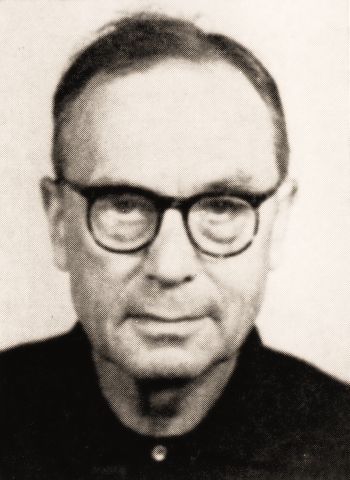In Memoriam
Malcolm Drummond Bone
(1935-1975)
Malcolm Bone was born in 1904 and entered the chemical engineer-ing profession after qualifying at the universities of London and Leeds. He joined Imperial Chemical Industries in Cheshire in 1929, but was almost immediately transferred to Billingham, on Teeside, where, with the exception of the war years, he spent his working life. He started his career at Billingham under the direction of Alexander Rule, an old member of the club. It was Rule who, while he was President in 1934-36, introduced him to the Ramblers.
In those far-off days before the war, Malcolm was a very active potholer and fell-walker; he was generally to be found at the legendary Gaping Gill meets of those years. He also took part in at least one of the expeditions organised by the club to continue the exploration of the caves in County Fermanagh, explorations which had been started by Brodrick and Rule before the First World War.
In the years between 1939 and 1945 Malcolm was in charge of Government “Shadow” Factories in Glasgow and in South Wales and he also worked at a factory at Heysham, in Lancashire. After the war he returned to Billingham, where he remained until his retirement in 1965.
After his retirement he and his wife divided their time between England and France: from spring to autumn in an old farm house at Salviac in the Dordogne, winter in a cottage above Low Row in Swaledale.
Malcolm was a Life Member of the Club. His membership spanned forty years and, as Mrs. Bone wrote to the Secretary “The Y.R.C. had been a great and very happy part of his life.” He was always interested in the affairs of the Club and willing to take responsibility, and what he undertook he did meticulously.
He continued to attend meets whenever he was in England. He organised highly successful ones himself—notably at Bolton Castle in Wensleydale and at the Buck Hotel, Reeth, in both of which his local knowledge was most advantageously used for the benefit of members. He presided with genial expertise over the preparation of the President’s punch, and over the serving of wine at Club meets at Low Hall Garth and Low Stern. He was a much liked and much respected figure in the Club, an unassuming man and a staunch friend. He had already booked for the 1974 dinner when he fell ill in France. He returned to England but reluctantly had to forego the dinner. He died on the 13th January, 1975. He will be greatly missed by all who knew him.
G.S.G. E.C.D.
Wilfred Booth
(1947-1975)
After joining the Club just after the last war, Wilf soon became a cheery and popular attender on potholing Meets. His first Meet was probably the very wet Disappointment Pot descent from a camp at Clapdale.
Strong and powerful, his happy grin will be remembered as anchor man on the heavy sisal lifelines used on the long ladder climbs in Ireland in 1948. He was even accused by some of his ungrateful clients of inflicting grave injury by over-pulling.
His work subsequently took him to the Midlands, and he had not been active for many years.
S.M.
David Christopher Haslam
(1955-1975)
The hills and mountains have been a great influence in the short life of David Haslam. He was born near to the Cleveland Hills; he has lived, walked, climbed, skied and camped amongst them and now he lies buried in the little churchyard at Kirby in the shadow of the same hills.
Born in 1933, he was educated at Yarm Grammar School, and went on to King’s College, London, where he qualified in Law. Later he set up his own practice as a solicitor in Middlesbrough. On December 18th, 1975 he died after a long illness.
David’s life had so many facets; he had the capacity to work hard and the capacity to enjoy life to the full. He also had the capacity to adapt himself to whatever life offered to him. Many will remember that through his illness which lasted nearly a quarter of his life, he never lost hope and always had a smile.
Rugby and cricket he played well, he found a natural aptitude for sailing, he climbed to a good standard, he was a strong walker, he potholed with enthusiasm and found great pleasure in simple camping.
My own personal remembrance will surely be in the Alps; he was a good companion on the high mountains. We shared there the joys of success and the frustrations of failure. We experienced a remarkable degree of compatibility in chmbing together, anticipating each other’s movements and thoughts during an expedition separated by 120 feet of rope.
David considered himself highly honoured to be invited, along with his father, to join the Club in 1955. He took part in every Club activity and acknowledged that his membership had helped him in many ways over the past twenty years. He made his mark in the annals of the Club and will not be forgotten by his contemporaries who enjoyed so much his friendship.
F.D.S.

